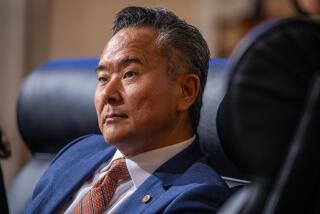Councilman Loses Bid to Delay Mail Fraud Trial
- Share via
Long Beach City Councilman James Wilson lost an attempt to delay his trial on 26 counts of mail fraud Tuesday, despite testimony in federal court in Los Angeles that Wilson suffers from a life-threatening heart ailment.
Wilson is charged with taking more than $50,000 in hidden payments from convicted political fixer W. Patrick Moriarty in exchange for introducing and voting for ordinances to legalize use of non-explosive fireworks in Long Beach and for lobbying for state legislation that would benefit Moriarty’s fireworks business.
U.S. District Court Judge Edward Rafeedie rejected a defense motion to delay the trial after hearing Wilson’s physician, Dr. Murray G. Menter, testify that he has “very serious concern” about the stress of the trial on his 58-year-old patient.
Judge’s Reasoning
Rafeedie noted that the councilman, a member of the Long Beach City Council for 16 years, has run for office three times since his heart condition was diagnosed and is planning to seek reelection again.
“I do not feel that the showing is sufficient to postpone the trial,” Rafeedie said. “I believe he will successfully participate in the trial and will have no trouble.”
A jury was selected Tuesday afternoon, and opening statements are scheduled for this morning. The trial is expected to last five or six days.
Wilson was indicted Jan. 23 on charges of taking a series of hidden payments from Moriarty between September, 1978, and March, 1983.
The prosecution contends that in exchange for the money, Wilson pushed the ordinances to legalize “safe and sane” fireworks in Long Beach and tried to influence state legislators to approve a Moriarty-backed Senate bill that would have prohibited local bans on non-explosive fireworks.
The measure, Senate Bill 99--approved by the Legislature and then vetoed by then Gov. Edmund G. Brown Jr. in the summer of 1982--barred any city or county from prohibiting the sale of “safe and sane” fireworks.
Payments to Wilson allegedly were concealed by routing money through firms partly owned by Moriarty--Financial Loan Consultants and B & M Development, a firm that was developing a condominium project in Baldwin Hills.
The government’s trial memo on the case, filed by Richard E. Drooyan, chief assistant to the U.S. attorney in Los Angeles, Robert C. Bonner, said that Wilson and Moriarty met shortly after the councilman was first elected in 1970.
Eight years later, according to the prosecution, Wilson asked Moriarty to help him find a second job, explaining that he could not remain on the City Council unless he earned additional income. Moriarty hired the councilman as personal consultant to assist him in governmental and political matters, the prosecution contends.
The prosecution charges that Moriarty arranged to have Financial Loan Consultants pay Wilson $500 a month as a supposed FLC employee, when, in fact, Moriarty would subsequently repay FLC, an arrangement lasting from early 1978 through May, 1981.
Payments to Wilson were increased to $1,500 from the middle of 1981 to January, 1983, and paid through B & M Development, the government claims. In addition, Moriarty purportedly lent Wilson $2,500 that was never repaid and finally paid the councilman $4,500 “severance.” Most of the money paid to Wilson was sent through the mail, the prosecution says.
Wilson’s attorney, Terry Amdur, has argued that his client was merely a consultant to Financial Loan Consultants, but the government claims that the councilman did “virtually nothing” for the firm from 1978 through January, 1983.
Moriarty, who pleaded guilty to seven counts of mail fraud and was sentenced Jan. 31 to seven years in prison, is expected to testify as a prosecution witness.
More to Read
Sign up for Essential California
The most important California stories and recommendations in your inbox every morning.
You may occasionally receive promotional content from the Los Angeles Times.













